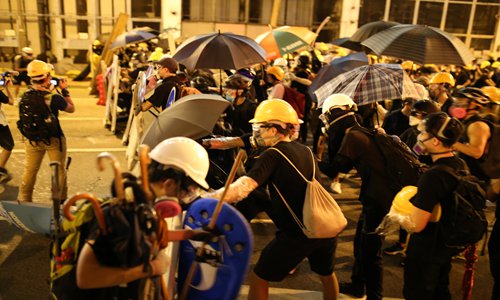HOME >> OPINION,SPECIAL-COVERAGE
HK’s law-abiding majority won’t remain silent
By Adam Garrie Source:Global Times Published: 2019/8/5 18:28:40

Radical protesters in Hong Kong block a road and assault police on July 21. Their behavior was widely condemned. Photo: Fan Lingzhi/GT
The ongoing events in Hong Kong Special Administrative Region (HKSAR) have already produced several effects. Investors and tourists are frightened, violent attacks against the elderly have been carried out, and South Asian immigrants have closed their shops.
Many people throughout the world question the future of Hong Kong. For decades, the HKSAR of the People's Republic of China was known for its economic openness and welcoming atmosphere for both Chinese, foreign employees, and tourists. Now, its reputation has been stained by the actions of a violent and lawless minority who are intent on bringing their city to its knees.
In a similar vein, and although the vast majority of Hong Kong's population remains a productive part of a normal region, this violent minority has inflicted upon Hong Kong a level of medium and potentially long-term damage like natural disasters and terrorist attacks have impaired other parts of the world.
For a protest to be legitimate, it needs to remain within legal boundaries, and in keeping with public decency. A specific goal must be in place. It cannot resort to violence. And it must be an organic movement free from foreign interference or agitators who wish to enrich themselves on a material level.
The protests erupted after a proposed law would have closed a loophole that provided shelter for fugitives in Hong Kong.
The proposed bill was softer than interstate judicial provisions within the US and other countries. It even offered more judicial review than the European Arrest Warrant, yet Hong Kong officials withdrew the proposal.
In any normal environment, the move should have brought an end to the protests. Unfortunately, the demonstrators did not disperse even after their demands were met. Instead, they changed into rioters and agitators, vandalized public property, desecrated state symbols, intimidated law-abiding immigrants, and brandished foreign flags.
Far from seeking to improve their country, the rioters seemed to be angry that they no longer live in a colony, and were part of a sovereign state. Western politicians have openly backed the rioters rather than calling for peaceful demonstrations. Meanwhile, the protestors have openly courted and received foreign support. Hong Kong's open economic system makes it easier to funnel funds to the protesters from outside of China.
Many have asked why China has taken a restrained approach from policing such action within its borders. Authorities in the US and France are quick to break up peaceful protests when they become lawless.
The answer can be found in how Beijing respects the "one country, two systems" principle. For now, it will let Hong Kong authorities handle the riots. The move places a level of responsibility not only on the Hong Kong officials but on ordinary residents to speak out on behalf of restoring peace, and the rule of law.
Ultimately, the only ones who can save the region are the people of Hong Kong. Of course, this is not to imply the Chinese government will tolerate such disturbances. It will only follow the "one country, two systems" principle.
Hong Kong has unique characteristics and responsibilities. There is little chance that ordinary people will tolerate the mayhem much longer. When the rioters are held accountable by law-abiding citizens, it will become a real movement that deserves the support of all decent people.
The author is director of Eurasia Future, an independent news platform. opinion@globaltimes.com.cn
Posted in: VIEWPOINT,FEATURE 3